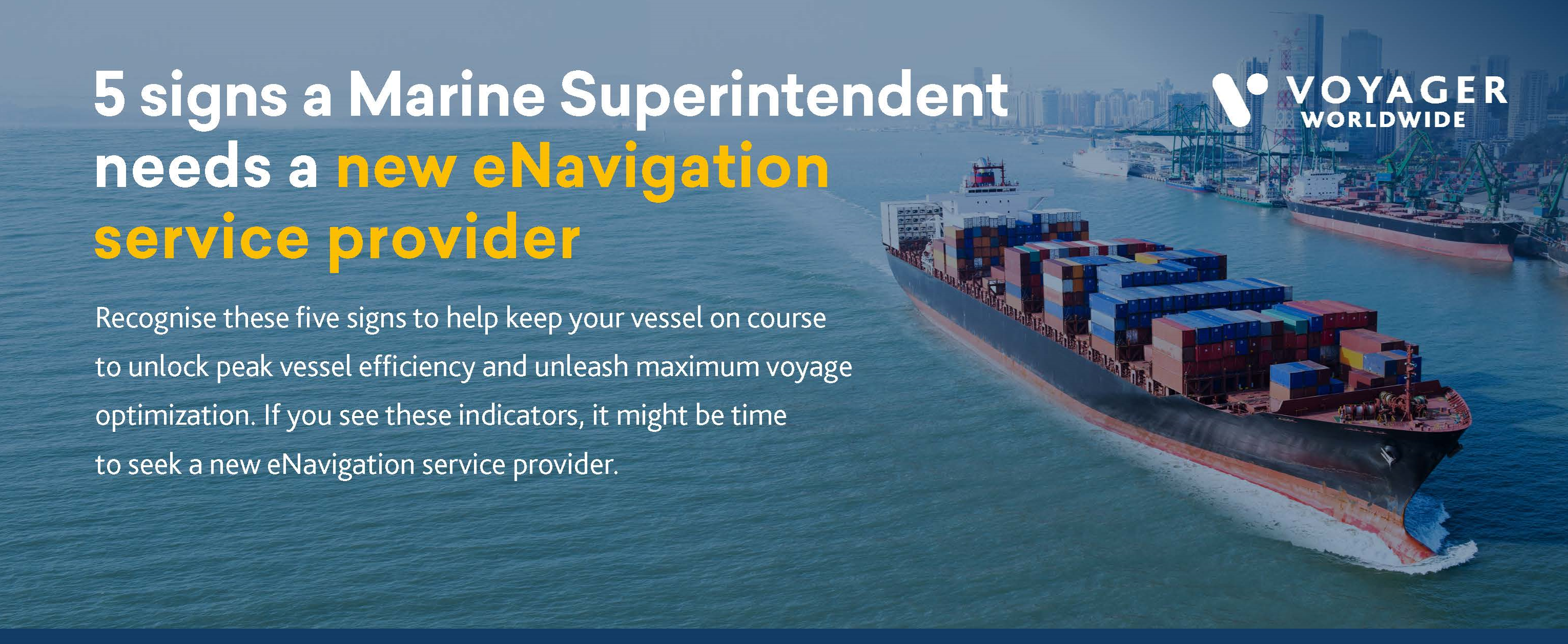Five signs you need a new eNavigation service provider

The need for higher vessel efficiency and greater voyage optimisation is bringing more would-be service and solution providers into the maritime industry. As the pressure increases to meet regulatory deadlines and improve commercial performance, vessel operators and managers have a bewildering degree of choice.
But how do you know if your navigation service provider is delivering the kind of in-depth service that actually provides benefits – and what kind of Key Performance Indicators should you look for?
1. Are compliance errors creeping into vessel operations?
An efficient voyage has numerous components but is first and foremost about safety. The right charts should be onboard and navigation processes in place, but it would be wrong to assume every voyage is error-free.
Typical errors can include missing ENC data for planned voyages, a situation that can result in otherwise avoidable port state control and vetting issues, ranging from financial penalties to detention.
Having the wrong chart inventory onboard can mean additional administration caused by high volumes of ENC orders across the fleet, but it is avoidable with tools that can provide better visibility of orders, holdings and licences.
2. Are you ordering more ENCs than you need?
Shipping operations are about redundancy. If a system fails, you need a back-up and that can lead to taking a ‘plan-B’ strategy beyond reasonable levels.
While some fleets may have gaps in their navigation data coverage, others risk over-ordering ENCs rather than focusing on route-based/voyage-based purchasing that can help to manage navigation costs.
Voyager Worldwide data shows the majority of vessels (even in the most well-run fleets) are over-ordering and over spending on ENCs. We’ve been tracking vessel spending since 2016 and found that on average vessels overspend by 20% a year on navigation when they are using route-based ordering. On an ENC budget of $4,500 a year that is close to $1,000 of unnecessary spending.
3. Is bridge efficiency declining rather than improving?
If it takes longer to plan a voyage, transfer it to the ECDIS and integrate weather routeing and other performance services into voyage decisions then additional time can be added to port stays and the voyage extended, using fuel unnecessarily.
Digital navigation has changed passage planning and voyage execution forever. Planning a voyage on paper required hours of work on small and large scale charts, checking every step was compliant with company requirements.
Tools like Voyager Planning Station have brought that down to 10-15 minutes with easy validation and amendment. For a busy mariner that’s the kind of time saving that makes a huge difference.
4. Are you still concerned about cyber risk?
Cyber security threats continue to grow, with attacks from botnets and ransomware increasingly every year. Vessel operators need to understand their options for cyber security and how this fits into a broader strategy for data security.
Protection onboard starts at the point of ship’s connectivity and the need to monitor and analyse system activity to identify and prevent attempted incursions. Just as important is the procedures that govern mariner behaviour.
Voyager Worldwide has partnered with the team at Be Cyber Aware at Sea to provide cyber security awareness training for the maritime and offshore industries in a course designed for the human element.
5. Is shore-side administration increasing?
As pressure grows to increase the interaction between ship and shore to provide greater visibility on vessel operations, so too does the administrative burden for superintendents. It has been true for some years that vessel operators are managing more assets with fewer people; the result is pressure on people and time.
Users need to have a complete suite of solutions at their fingertips, including current and historical voyage tracking, nautical miles sailed and sea hours. They need to be able to predict cost more accurately and improve budgeting and maintenance scheduling.
In this case, Voyager Fleet Insight provides a detailed view of individual vessels’ navigational activities and compliance requirements helps you ensure that your voyage is compliant at all times.
These are just some of the tools from Voyager Worldwide that can help you better manage your voyage planning, routeing and sailing, cyber security and fleet administration.
We know the risks to safety and efficiency because our team includes mariners and superintendents who have lived these challenges and have help to develop robust solutions.
If your mariners or managers can answer yes to any of the above questions then simply complete this eNavigation calculator to understand where you could improve efficiency and save on navigation supplies.

